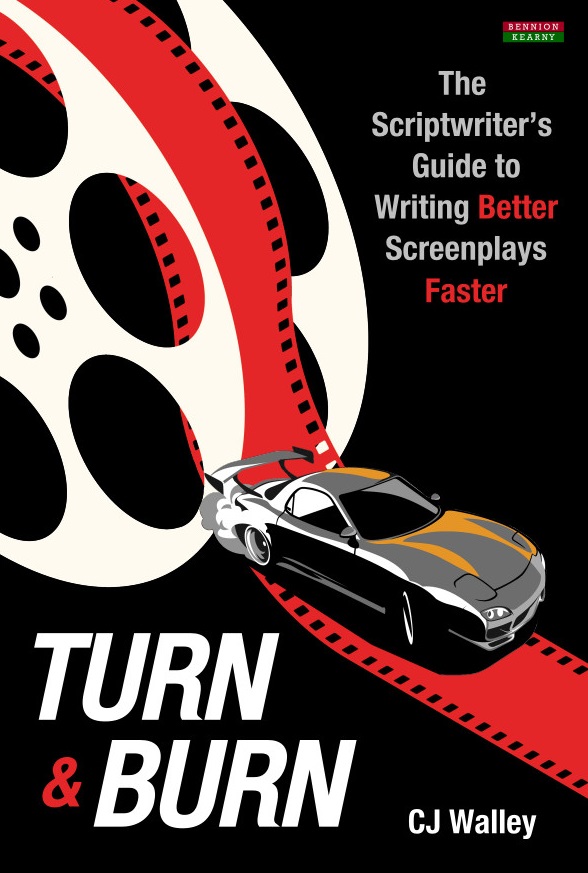The Foreword to the practical book for screenwriters, from CJ Walley, explaining what Turn & Burn is all about…
Foreword
Firstly, before I get into things, I want to talk a little about who I am and my motivation for sharing my thinking on screenwriting. When I wrote parts of this guide, I was a nobody – five years into writing – with no real success stories to speak of, other than a lot of short script options that never seemed to manifest into production. I’m pleased to say that, since then, at this time of writing – another five years later – after getting the green-light and travelling from the middle of England to sunny California to be on set and meet some of my heroes, I’ve become a working writer-producer who’s written and helped produce three independent feature films, the kind of films that get released and distributed internationally via major platforms and covered by the likes of Deadline, US Weekly, and KTLA Morning News.
While you may not find the movies I’m involved with playing in your local theatre or pictures of myself on the red carpet, I am building a very real screenwriting career, and I feel that’s important because it shows that the methodology I detail in this book works, and has been working for me for a long time.
I get paid to write movies now, the dream has been realised, and I love my new career dearly. It is, quite frankly, a wonderful way to work and live. I want you to have this experience for yourself because it is indeed life-changing and incredibly fulfilling, even at an indie filmmaking level. But I need you to know this, too; I tried to give up writing multiple times, and the slog of trying to break in to the film industry is still very fresh in my mind. I’ve laid awake, night after night, worrying things would never happen. I’ve been reduced to tears by cruel feedback, which told me I didn’t have what it takes. I’ve felt constantly tormented by the need to write while watching my finances run dry, my relationships wane, and my sanity deteriorate. I’m in the rare position where I have a foot in both camps and can relate to writers on both sides.
Something I’ve come to accept is that we do not choose to write, writing chooses us, and it’s a heavy burden to carry in a world that has become reluctant to fund unknown artistic ambition. As a result, those of us who are chosen only have two paths we can realistically take… to try and starve the beast, or learn to tame it. The former, the choice to try and stop writing, will only lead to guilt and later regret. The latter, the choice to hone our craft and embrace our voice, can only lead to finding our love for it and, subsequently, the audience we desire. We have to invest effort to see a reward, but it’s essential that effort is directed studiously toward becoming a better, more entertaining, more emotionally stimulating, more philosophically inspiring writer rather than simply exhausting ourselves with sheer output and hoping for the best. There is a creative genius inside you – that’s why you’re here, and many others aren’t – but that genius must be humbled by learning before it becomes empowered with knowledge. To keep churning out material with the belief we have everything it takes and nothing more to discover within the craft, the art, or ourselves is the equivalent of clinging desperately onto the bull and believing it will tire before we do.
The artist is nothing without the gift, but the gift is nothing without the work.
Emile Zola
In this guide, I’m not trying to position myself as a guru in any way. I want to share my process and thinking for one simple reason, I know the struggle, and I’m sick of how that struggle is continually preyed upon by opportunists. I’m tired of how that struggle is exacerbated by endless subjective debates that seemingly make any commitment within the craft a crossroads between fame and fortune or pain and despair. I’m heartbroken by how that struggle is made so much unnecessarily more agonising than it needs to be that it causes so many keen artists to eventually doubt themselves and give up on their dreams. I want you to be a happy writer because there’s every chance the art you go on to create may one day bring unexpected joy to my life. I also really don’t want you to be an unhappy writer either because I’ve been there myself and know the anguish it can ultimately bring.
For what it’s worth, I actually come back to this guide and reference it often, both to utilise its thinking and to remind me of its principles. What I’m sharing here, with you, is something I still get a lot of value from as a working writer. It is a methodology that makes the process easier for me while also generating better results. My hope is that it does the same for you. If you have any foreboding feelings going into this, please leave them at the door now and relax. This isn’t about making your writing life tougher or beating you up. This is me reaching out my hand, with a smile on my face, and offering to help you up the mountain with a little less weight on your shoulders.
In the time a very much cut-back version of this guide has been available online, I’m pleased to say that I’ve been contacted by many who’ve found it useful and some that even described it as “game-changing” for their development. Knowing that it’s working so well for people has inspired me to keep expanding upon it, resulting in the very book you’re reading now, which has three times the content, along with stories from my own experience about gradually breaking in – warts and all.
That said, I accept there’s a chance that some of the guidance I’m sharing may not be ideal for you. That leads me to open with the best piece of advice I can ever give another screenwriter: never trust a single source of opinion. Read, watch, and listen to the many information sources out there and reach a considered conclusion of your own, preferably the one that brings out the best in you as a writer. And remember, you absolutely do not have to pay to learn or to be discovered – I hope to demonstrate I’m proof of that, at least.
No Petty Rules, No Silly Formulas
As black and white as scripts may appear on the surface, screenwriting is a very subjective medium. I care about good craft and feel that comes from positivity, motivation, building on strengths, and tackling weaknesses. I also appreciate that, when we talk about “screenwriting”, we are typically narrowing the art form down to western highly-commercial mainstream feature film writing. I’m not about to get into how many lines I believe an action paragraph should be, nor start claiming I’ve unlocked some sort of secret Hollywood template that guarantees success. What I’m sharing here is my processes and my mindset, which I believe maximise my creativity. The aim here, rather than being reductive and telling you what “not to do” (a phrase that shouldn’t exist within the arts), is to instead build on the core of storytelling principles and artistic values that should empower you into knowing exactly what you need to do.
So Seriously, What the Hell is Turn & Burn?
Well, it’s all about getting on with writing scripts as efficiently as possible. It’s about asking ourselves the important questions which guide us while still encouraging us to put our fingers to the keyboard. It’s a range of tools, methods, and thinking that I’ve developed that I’ve genuinely found useful. It encapsulates the creation and development of story from theme and premise to structure and scene. The focus is on pre-writing to help brainstorm ideas efficiently and maximise the entertainment factor without getting lost along the way and having to continually rewrite a complete script. It’s also not too heavy as I don’t want to go over the wealth of information that’s already out there. It’s aimed at writers who’ve found themselves in the position I did – feeling I had a strong voice but struggling to get my head around the fundamentals of story mechanics and career building. The intent is to use Turn & Burn as a set of training wheels until the active practice becomes mostly subconscious second nature.
What it isn’t is a shortcut. There are no shortcuts. There are plenty of bad turns, circular paths, and dead ends, though, and Turn & Burn is written to help avoid the many pitfalls you can fall into due to being given bad advice, preyed upon, or being sucked into self-destructive group-think. This all said (and please understand this before all else), finding your voice and honing your craft to the point of working within the film industry demands a tremendous amount of commitment in terms of time and energy. This is a pursuit that can take many years, even decades, to get even the slightest traction.
* * * * *


